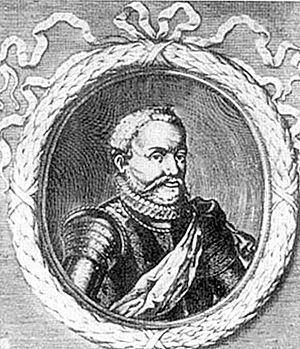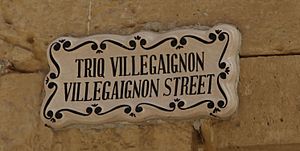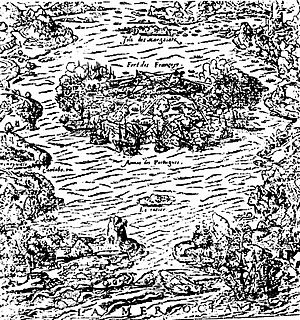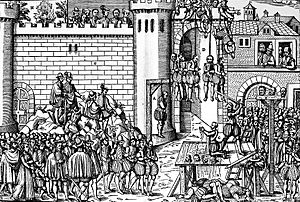Nicolas Durand de Villegaignon facts for kids
Quick facts for kids
Fra Nicolas Durand de Villegaignon
|
|
|---|---|

Nicolas Durand de Villegaignon
|
|
| Born | 1510 Provins, Seine et Marne, France |
| Died | 9 January 1571 (aged 61-60) Beauvais, Picardy, France |
| Allegiance | |
| Years of service | 1521–1571 |
| Battles/wars |
|
Nicolas Durand, sieur de Villegaignon (born in 1510 – died on January 9, 1571) was a French naval officer. He was also a Commander of the Knights of Malta. He tried to help the Huguenots (French Protestants) escape religious persecution in France.
Villegaignon was a famous person in his time. He was a mix of soldier, scientist, explorer, and adventurer. He fought against pirates in the Mediterranean Sea. He also took part in several wars.
Nicolas de Villegaignon was born in Provins, France. He was the nephew of Philippe Villiers de L'Isle-Adam, who was a Grand Master of the Order of Malta. Nicolas became a Knight of the Order in 1521.
Contents
Fighting the Ottoman Empire
Nicolas de Villegaignon fought in many battles against the Ottoman Empire. The French usually did not fight the Ottomans because they were allies. However, Villegaignon's main loyalty was to the Order of Malta. This Order often fought against the Ottomans.
He joined a difficult trip against Algiers in 1541. He also fought the Ottomans in Hungary from 1542 to 1546.
Helping Mary, Queen of Scots
In 1548, Villegaignon led the French ships that took Mary, Queen of Scots to France. She was only five years old then. She was going to marry the French prince. This was a very brave plan. His ships sailed secretly around Scotland. The English fleet was expecting an attack from a different direction.
In March 1549, he was back in Scotland. He helped capture Ferniehirst Castle from the English. Nicolas suggested building a fort at Roxburgh. His plan was chosen after the French ambassador helped.
Battles in Malta and Tripoli
Villegaignon helped push back the Ottomans from Malta in 1551. After that, the Ottomans went on to attack Gozo. He was also present at the Siege of Tripoli (1551) against the Ottomans. He wrote about this battle in 1553.
Villegaignon showed great courage during the siege. He bravely defended Gaspard de Vallier. Vallier was the commander of Tripoli who lost the battle. The Grand Master d'Homedes blamed Vallier for the defeat. Nicolas de Villegaignon strongly defended him. He showed that d'Homedes was not being fair.
France Antarctique: A French Colony in Brazil
Villegaignon became important for King Henry II's plan to create "France Antarctique". This was a French colony in what is now Rio de Janeiro, Brazil. In 1555, he sailed there with two ships and 600 soldiers and settlers. Most of these were French Huguenots and Swiss Protestants. They wanted to escape religious persecution in Europe.
Villegaignon's first goal was to help the Huguenots start a colony. He also wanted to create a base in Brazil. This base would help France get brazil wood. This wood was very valuable for red dye and building. It even gave Brazil its name. Europeans also hoped to find precious metals and stones there.
However, Villegaignon and the Protestants soon argued about religious beliefs. Villegaignon eventually sent away those who disagreed with him.
After several fights against the Portuguese, the French settlers were defeated. This happened on March 15–16, 1558. The Portuguese forces were led by Estácio de Sá.
Returning to France
Villegaignon went back to France in 1559. He was tired of the fighting between Catholics and Protestants in the small colony. He left his nephew, Bois-le-Comte, in charge of the colony. Villegaignon tried to get more money and ships for the colony. But the religious fighting in France made colonial adventures less important.
After the colony fell to the Portuguese, Villegaignon gave up his claims to France Antarctique. He received 30,000 French coins from the Portuguese.
Later Life and Writings
In 1560, Villegaignon challenged John Calvin, a Protestant leader, to a debate. Calvin refused. Villegaignon then actively worked against the Protestants. He helped stop the Amboise conspiracy, a plot against the French king.
In 1561, a writer named Pierre Richier published a book against Villegaignon. It was called "Refutation of the foolish imaginations, terrible blasphemies, errors and lies of Nicolas Durand, named Villagagnon."
New attempts were made to create a Protestant colony in the New World. These were in French Florida from 1562 to 1565. They were led by Jean Ribault and René de Laudonnière.
From 1568, Villegaignon represented the Order of Malta at the French Royal Court. In 1569, he published a new book about religious beliefs.
Villegaignon became the Commander of the Order of Malta in Beauvais. He died there on January 9, 1571, when he was about 60 years old.
The Catholic writer André Thévet had traveled with Villegaignon to Brazil. In 1572, he wrote about the Brazil adventure. He also attacked the Protestants in his book. The Protestant writer Jean Léry later wrote his own book in 1578, telling his side of the story.
Legacy and Recognition

The Austrian writer Stefan Zweig described Villegaignon in his book Brazil, A Land of the Future:
Nicolas Durand de Villegaignon was a mix of pirate and scientist. He was a tricky but interesting person, typical of the Renaissance period. He was brilliant in war and also enjoyed the arts. The poet Ronsard praised him, and the Royal Court feared him. This was because his personality was hard to predict. He disliked regular jobs and important positions. His changing spirit preferred to be free to follow his wild ideas. Protestants thought he was Catholic, and Catholics thought he was Protestant. No one knew which side he was truly on. He probably only knew he wanted to do something big, different, wild, daring, and extraordinary.
In 2012, a TV series called Rouge Brésil (Red Brazil) was made. It was about the history of France Antarctique. The actor Stellan Skarsgård played Villegaignon in the series.
A street in the city of Mdina, Malta, is named after Villegaignon.
He appears as an important character in the novel The Course of Fortune by Tony Rothman. This book is about the events leading up to the Great Siege of Malta in 1565.
He is also a character in Dorothy Dunnett's novel The Disorderly Knights. This is the third book in her Lymond Chronicles series.
The knight is also featured in Eight Pointed Cross by Marthese Fenech. This historical novel is the first of a trilogy. It ends with the Great Siege of Malta in 1565.
See also
 In Spanish: Nicolas Durand de Villegagnon para niños
In Spanish: Nicolas Durand de Villegagnon para niños
- Jean de Cointac
- Villegagnon Island
 | Janet Taylor Pickett |
 | Synthia Saint James |
 | Howardena Pindell |
 | Faith Ringgold |



